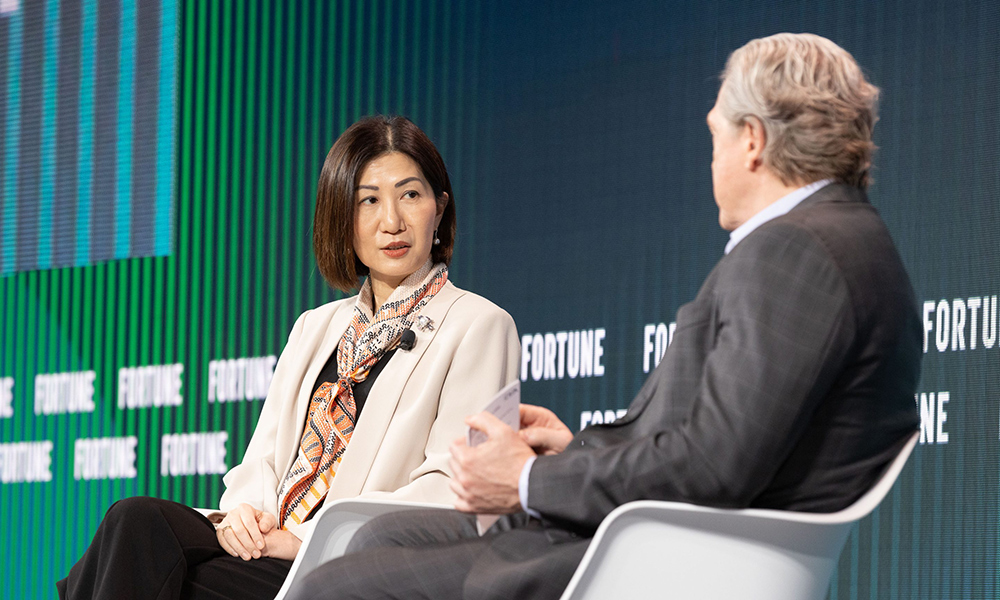 2024年3月27日,,香港交易所集團(tuán)(HKEX)的首席執(zhí)行官陳翊庭在香港瑰麗酒店舉辦的《財(cái)富》創(chuàng)新論壇上發(fā)言,。圖片來(lái)源:TIMOTHY O'ROURKE FOR FORTUNE
2024年3月27日,,香港交易所集團(tuán)(HKEX)的首席執(zhí)行官陳翊庭在香港瑰麗酒店舉辦的《財(cái)富》創(chuàng)新論壇上發(fā)言,。圖片來(lái)源:TIMOTHY O'ROURKE FOR FORTUNE香港股市連連下跌,。恒生指數(shù)(Hang Seng Index)是追蹤香港交易所大型公司的基準(zhǔn)指數(shù),已經(jīng)連續(xù)四年下跌,。但香港交易所集團(tuán)(HKEX)的負(fù)責(zé)人認(rèn)為,,香港與中國(guó)內(nèi)地的關(guān)系將助力香港恢復(fù)增長(zhǎng)。
陳翊庭將香港股市過(guò)去數(shù)年連連下跌至少部分歸咎于短期的銀行業(yè)問(wèn)題——貨幣政策收緊,,原因是在高利率環(huán)境下,,資本市場(chǎng)往往舉步維艱。但陳翊庭表示,,香港作為中國(guó)與外部世界之間的超級(jí)連接器,,意味著從長(zhǎng)遠(yuǎn)來(lái)看,還會(huì)有機(jī)會(huì)實(shí)現(xiàn)增長(zhǎng),。
香港交易所集團(tuán)的新任首席執(zhí)行官陳翊庭于3月27日在香港舉辦的《財(cái)富》創(chuàng)新論壇上說(shuō):“我無(wú)法告訴大家股市是否已經(jīng)觸底,。我們面臨諸多挑戰(zhàn),但同時(shí)我也發(fā)現(xiàn)了更多機(jī)遇,?!?/p>
香港作為超級(jí)連接器
陳翊庭稱:“交易所的基本原理是將資本與機(jī)會(huì)連接起來(lái),即讓投資者與發(fā)行人實(shí)現(xiàn)對(duì)接,?!辈⒀a(bǔ)充道,香港在傳統(tǒng)上仍然是進(jìn)入中國(guó)內(nèi)地市場(chǎng)的門戶,。
陳翊庭指出,,這對(duì)香港大有裨益,因?yàn)閺拈L(zhǎng)遠(yuǎn)來(lái)看,,中國(guó)內(nèi)地仍然有巨大的增長(zhǎng)潛力,,并援引了中國(guó)政府對(duì)今年經(jīng)濟(jì)增長(zhǎng)5%的預(yù)測(cè)。雖然這一數(shù)字低于新冠疫情爆發(fā)前十年7.7%的年平均增長(zhǎng)率,,但陳翊庭提醒與會(huì)者,,對(duì)世界第二大經(jīng)濟(jì)體來(lái)說(shuō),,5%的增長(zhǎng)率仍然是一個(gè)巨大的數(shù)字。
同樣,,陳翊庭表示,,與2022年的數(shù)字相比,香港去年首次公開募股的降幅并不明顯,。(2023年有73宗首次公開募股,,2022年有90宗)。陳翊庭承認(rèn),,籌資額大幅下降,,但指出估值驟降是全球性現(xiàn)象。
陳翊庭說(shuō),,這種情況也將很快扭轉(zhuǎn),。
陳翊庭還稱:“激動(dòng)人心的是有很多公司在努力開發(fā)新產(chǎn)品、提出新發(fā)明,,未來(lái)將有非常多發(fā)行人出現(xiàn),。”
陳翊庭指出,,香港交易所集團(tuán)希望通過(guò)增加與其他交易所的互動(dòng)來(lái)增加上市企業(yè)規(guī)模,,并說(shuō),香港交易所集團(tuán)已經(jīng)與東南亞的數(shù)家交易所簽署了諒解備忘錄,,并在新加坡設(shè)立了辦事處,。
陳翊庭表示,所做的一切努力都是為了確保公司在考慮進(jìn)行二次上市或雙重上市時(shí),,會(huì)考慮到香港,。
但陳翊庭預(yù)測(cè),這些公司最終將需要開拓更深層次的市場(chǎng),,例如香港,。
陳翊庭是誰(shuí)?
今年3月1日,,陳翊庭接替歐冠升(Nicolas Aguzin)出任香港交易所集團(tuán)的首席執(zhí)行官,。
陳翊庭是香港交易所集團(tuán)的首位女性首席執(zhí)行官,此前她曾經(jīng)擔(dān)任聯(lián)席首席運(yùn)營(yíng)官,。她的上任正值香港交易所集團(tuán)推動(dòng)上市公司提高女性董事,、高管比例之際。2022年,,香港交易所集團(tuán)規(guī)定,,到2024年年底,所有上市公司必須禁止單一性別董事會(huì),。新上市的候選公司也必須至少有一名女性董事,。
“當(dāng)我們提出這一規(guī)定時(shí),,大約有800家公司擁有單一性別董事會(huì)。那是大約一年前的事情了,。到目前為止,這一數(shù)字略低于500,?!彼f(shuō),并補(bǔ)充道,,隨著公司進(jìn)入4月和5月的年度股東大會(huì)季,,這一數(shù)字將進(jìn)一步下降。
陳翊庭表示,,香港交易所集團(tuán)尚未決定如何懲罰那些未遵守交易所指令,,未能在年底前實(shí)現(xiàn)董事會(huì)多元化的公司。至少,,可能會(huì)進(jìn)行“點(diǎn)名批評(píng)”,,這可能會(huì)讓如今注重多元化等政策的大型投資基金望而卻步。
在企業(yè)董事會(huì)性別多元化方面,,香港落后于其他金融中心,。3月27日早些時(shí)候,在《財(cái)富》創(chuàng)新論壇的“最具影響力的商界女性早餐會(huì)”上,,陳翊庭表示,,香港進(jìn)步緩慢的部分原因是香港的家族企業(yè)眾多,而這些企業(yè)在接受性別平等方面歷來(lái)進(jìn)展緩慢,。(財(cái)富中文網(wǎng))
譯者:中慧言-王芳
香港股市連連下跌,。恒生指數(shù)(Hang Seng Index)是追蹤香港交易所大型公司的基準(zhǔn)指數(shù),已經(jīng)連續(xù)四年下跌,。但香港交易所集團(tuán)(HKEX)的負(fù)責(zé)人認(rèn)為,,香港與中國(guó)內(nèi)地的關(guān)系將助力香港恢復(fù)增長(zhǎng)。
陳翊庭將香港股市過(guò)去數(shù)年連連下跌至少部分歸咎于短期的銀行業(yè)問(wèn)題——貨幣政策收緊,,原因是在高利率環(huán)境下,,資本市場(chǎng)往往舉步維艱。但陳翊庭表示,,香港作為中國(guó)與外部世界之間的超級(jí)連接器,,意味著從長(zhǎng)遠(yuǎn)來(lái)看,還會(huì)有機(jī)會(huì)實(shí)現(xiàn)增長(zhǎng),。
香港交易所集團(tuán)的新任首席執(zhí)行官陳翊庭于3月27日在香港舉辦的《財(cái)富》創(chuàng)新論壇上說(shuō):“我無(wú)法告訴大家股市是否已經(jīng)觸底,。我們面臨諸多挑戰(zhàn),但同時(shí)我也發(fā)現(xiàn)了更多機(jī)遇,?!?/p>
香港作為超級(jí)連接器
陳翊庭稱:“交易所的基本原理是將資本與機(jī)會(huì)連接起來(lái),,即讓投資者與發(fā)行人實(shí)現(xiàn)對(duì)接?!辈⒀a(bǔ)充道,,香港在傳統(tǒng)上仍然是進(jìn)入中國(guó)內(nèi)地市場(chǎng)的門戶。
陳翊庭指出,,這對(duì)香港大有裨益,,因?yàn)閺拈L(zhǎng)遠(yuǎn)來(lái)看,中國(guó)內(nèi)地仍然有巨大的增長(zhǎng)潛力,,并援引了中國(guó)政府對(duì)今年經(jīng)濟(jì)增長(zhǎng)5%的預(yù)測(cè),。雖然這一數(shù)字低于新冠疫情爆發(fā)前十年7.7%的年平均增長(zhǎng)率,但陳翊庭提醒與會(huì)者,,對(duì)世界第二大經(jīng)濟(jì)體來(lái)說(shuō),,5%的增長(zhǎng)率仍然是一個(gè)巨大的數(shù)字。
同樣,,陳翊庭表示,,與2022年的數(shù)字相比,香港去年首次公開募股的降幅并不明顯,。(2023年有73宗首次公開募股,,2022年有90宗)。陳翊庭承認(rèn),,籌資額大幅下降,,但指出估值驟降是全球性現(xiàn)象。
陳翊庭說(shuō),,這種情況也將很快扭轉(zhuǎn),。
陳翊庭還稱:“激動(dòng)人心的是有很多公司在努力開發(fā)新產(chǎn)品、提出新發(fā)明,,未來(lái)將有非常多發(fā)行人出現(xiàn),。”
陳翊庭指出,,香港交易所集團(tuán)希望通過(guò)增加與其他交易所的互動(dòng)來(lái)增加上市企業(yè)規(guī)模,,并說(shuō),香港交易所集團(tuán)已經(jīng)與東南亞的數(shù)家交易所簽署了諒解備忘錄,,并在新加坡設(shè)立了辦事處,。
陳翊庭表示,所做的一切努力都是為了確保公司在考慮進(jìn)行二次上市或雙重上市時(shí),,會(huì)考慮到香港,。
但陳翊庭預(yù)測(cè),這些公司最終將需要開拓更深層次的市場(chǎng),例如香港,。
陳翊庭是誰(shuí),?
今年3月1日,陳翊庭接替歐冠升(Nicolas Aguzin)出任香港交易所集團(tuán)的首席執(zhí)行官,。
陳翊庭是香港交易所集團(tuán)的首位女性首席執(zhí)行官,,此前她曾經(jīng)擔(dān)任聯(lián)席首席運(yùn)營(yíng)官。她的上任正值香港交易所集團(tuán)推動(dòng)上市公司提高女性董事,、高管比例之際,。2022年,香港交易所集團(tuán)規(guī)定,,到2024年年底,所有上市公司必須禁止單一性別董事會(huì),。新上市的候選公司也必須至少有一名女性董事,。
“當(dāng)我們提出這一規(guī)定時(shí),大約有800家公司擁有單一性別董事會(huì),。那是大約一年前的事情了,。到目前為止,這一數(shù)字略低于500,?!彼f(shuō),并補(bǔ)充道,,隨著公司進(jìn)入4月和5月的年度股東大會(huì)季,,這一數(shù)字將進(jìn)一步下降。
陳翊庭表示,,香港交易所集團(tuán)尚未決定如何懲罰那些未遵守交易所指令,,未能在年底前實(shí)現(xiàn)董事會(huì)多元化的公司。至少,,可能會(huì)進(jìn)行“點(diǎn)名批評(píng)”,,這可能會(huì)讓如今注重多元化等政策的大型投資基金望而卻步。
在企業(yè)董事會(huì)性別多元化方面,,香港落后于其他金融中心,。3月27日早些時(shí)候,在《財(cái)富》創(chuàng)新論壇的“最具影響力的商界女性早餐會(huì)”上,,陳翊庭表示,,香港進(jìn)步緩慢的部分原因是香港的家族企業(yè)眾多,而這些企業(yè)在接受性別平等方面歷來(lái)進(jìn)展緩慢,。(財(cái)富中文網(wǎng))
譯者:中慧言-王芳
Hong Kong’s stock market is on a losing streak. The Hang Seng Index, the benchmark that tracks the largest companies on the city’s stock exchange, has dropped for four straight years. But the head of the city’s exchange believes that Hong Kong’s relationship with China—often blamed for the slowdown—will be what returns it to growth.
Chan blamed Hong Kong’s decline in the last few years, at least in part, on a short term banking issue—tighter monetary policies—as capital markets tend to struggle in high interest rate environments. But Chan said Hong Kong’s role as a super-connector between China and the outer world means there will be opportunities again in the long-run.
“I won’t be able to tell you whether they’ve touched bottom or not,” said Bonnie Chan, the new CEO of the Hong Kong Exchanges and Clearing (HKEX), at the Fortune Innovation Forum in Hong Kong on March 27. “[There are] a lot of challenges in front of us, but at the same time I see even more opportunities.”
Hong Kong as a super-connector
“The very basics of an exchange is connecting capital with opportunities, so whoever has the money with whoever needs the money,” Chan said, adding that Hong Kong still functions, as it traditionally has, as the gateway to the Chinese market.
That plays in Hong Kong’s favor because China still has a lot of growth potential over the long-term, Chan said, citing Beijing’s 5% growth forecast for this year. That’s less than the 7.7% annual growth it averaged in the decade before the pandemic, but Chan reminded the audience that 5% growth is still a huge number for the world’s second largest economy.
Similarly, Chan noted that the drop in initial public offerings Hong Kong experienced last year was not significant when comparing it to 2022 numbers. (There were 73 IPOs in 2023 and 90 in 2022). Chan admitted the drop in funds raised was significant, but noted that the plunge in valuations was worldwide.
This too, Chan said, would turn around soon.
“There are just so many exciting companies trying to figure out new products, come up with new inventions, and this will be a very strong supply of issuers down the road,” Chan said.
One way Chan said Hong Kong’s exchange is looking to boost its listings is to increase its interactions with other exchanges. She said HKEX has signed memorandums of understanding with several exchanges in Southeast Asia and also has an office in Singapore.
All these efforts, Chan says, are to ensure that Hong Kong is considered when companies are thinking of doing a second listing or a dual primary listing. She notes that companies in recent years have chosen to list on domestic exchanges, and suggested that rising nationalism and COVID controls on travel could be the cause.
But eventually these firms will need to tap deeper markets like Hong Kong, Chan predicted.
Who is Bonnie Chan?
Bonnie Chan was appointed as HKEX’s CEO on March 1, taking over from Nicolas Aguzin.
Chan is the bourse operator’s first woman CEO, after serving as the company’s co-chief operating officer at HKEX. Her ascension to the top job comes as the company is pushing for better gender representation at public companies. In 2022, HKEX mandated that all listed companies must stop having single-gender boards by the end of 2024. Candidates for new listings must also have at least one woman director.
“When we introduced that rule, the number was standing at around 800 companies with same gender boards. That was about a year ago. By now the number is slightly below 500,” Chan said. She added that the number will drop even further as companies move into annual general meeting season in April and May.
HKEX has yet to decide how to punish companies that have not complied with the exchange’s directive to diversify their board by the end of the year, Chan said. At the very least, there could be some “naming and shaming,” which could dissuade big investment funds that now focus on policies such as diversity.
Hong Kong is behind other financial hubs when it comes to gender diversity on corporate boards. Earlier on Wednesday, at a Most Powerful Women breakfast session at the Fortune Innovation Forum, Chan suggested that Hong Kong’s slow progress was due in part to the city’s large number of family-owned companies, which are traditionally slow to embrace gender equality.






